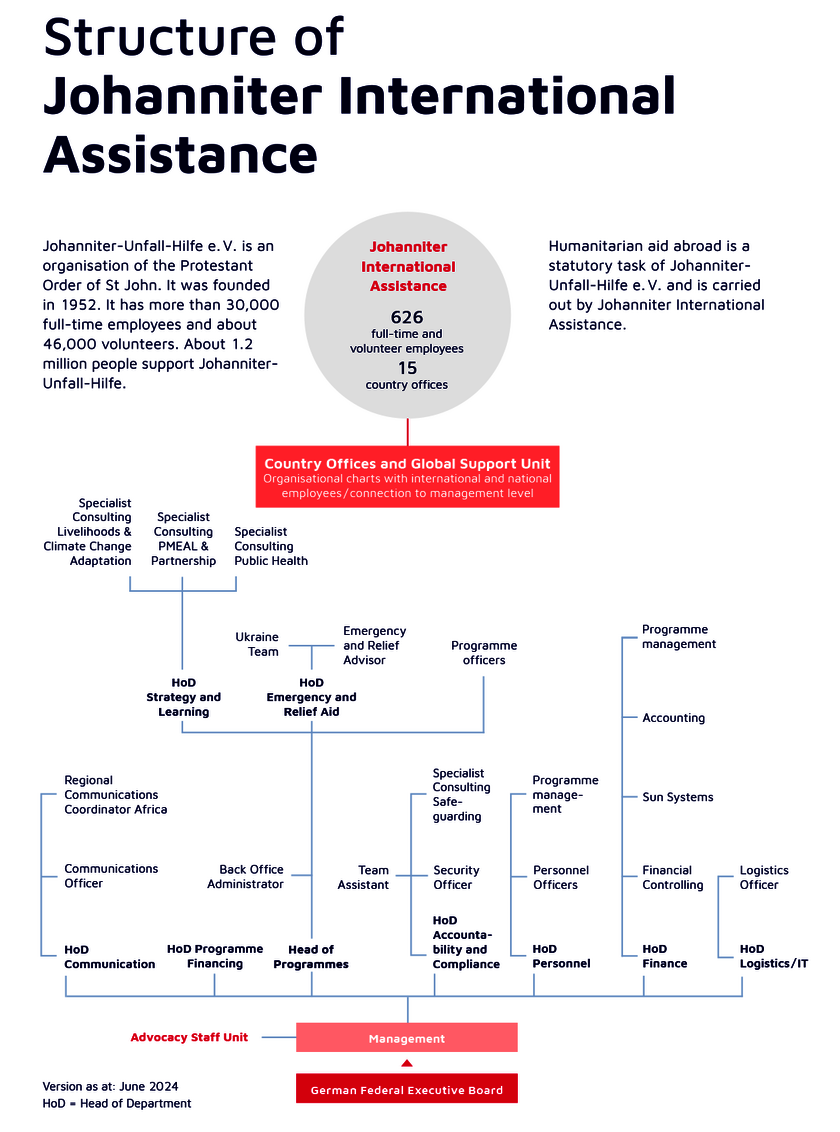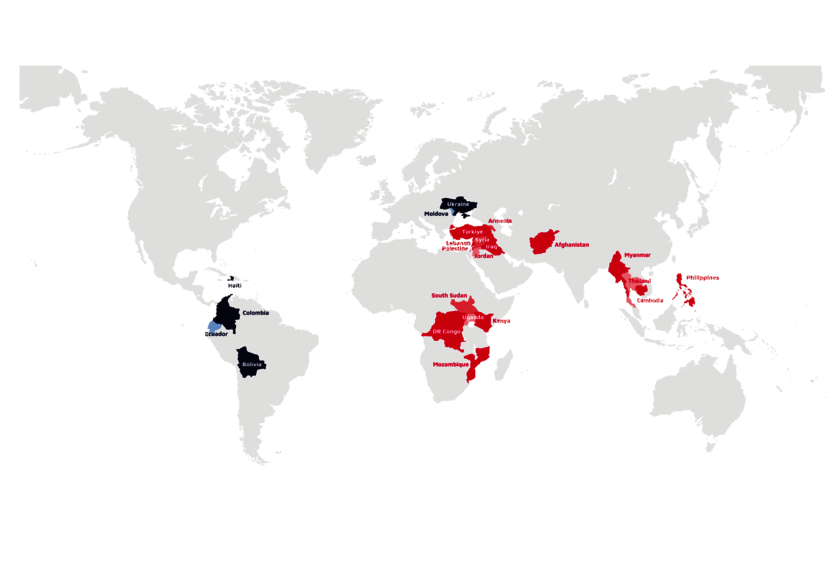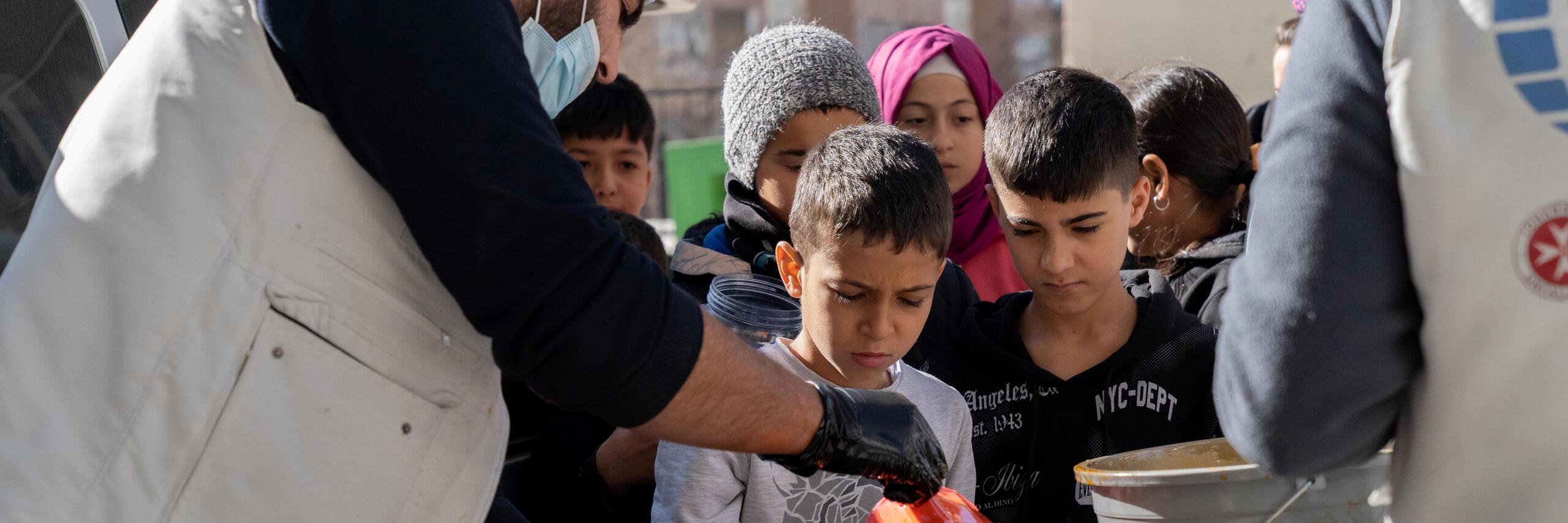Annual Report 23

Dear friends of Johanniter International Assistance
2023 was characterised by many humanitarian crises, the effects of which will continue to influence our work in 2024.
In addition to Ukraine and Gaza, crises such as Myanmar, the Democratic Republic of the Congo and South Sudan are increasingly moving out of focus.
In all contexts, we are working with our partner organisations to alleviate people’s suffering and support reconstruction wherever possible.
Thank you for being at our side!
Yours
Susanne Wesemann
Who we are
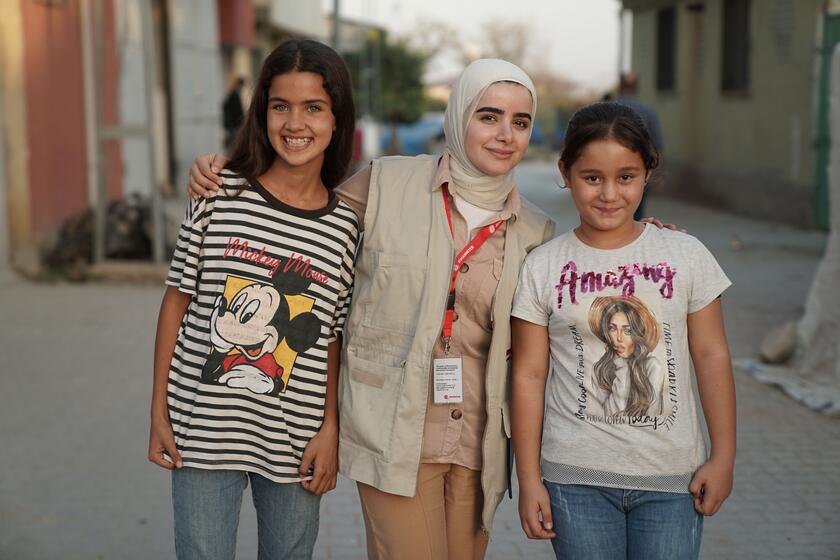
We care deeply about people, the health of every individual and human relationships.
We learn with and from each other. We enquire, listen and support local people in what they need for a healthy and good life. Together, we build a strong network of humanity that supports people in crises and disasters.
In 2023, we continued to develop in all areas within the organisation. We have, therefore, continually contributed to getting one step closer to achieving our goals by 2027.
For fair partnerships
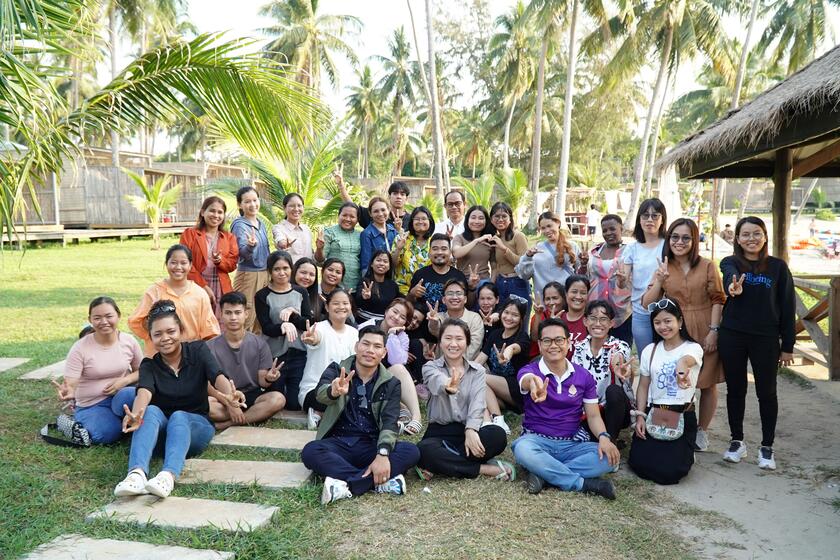
Johanniter is a signatory to the Charter 4 Change. The eight voluntary commitments anchored in this charter aimed at strengthening the visibility and role of local partner organisations. At Johanniter, we want to emphasise the importance and contribution of local partners to donors and the public, and advocate for their direct support.
As an international non-governmental organisation (NGO), we work closely with national and local partners. We have set ourselves the goal of implementing the concept of localisation in humanitarian aid. Our partners’ role is to be strengthened in all phases of project planning and implementation. To that end, we support the long-term capacity building of our partner organisations.
Sustainability
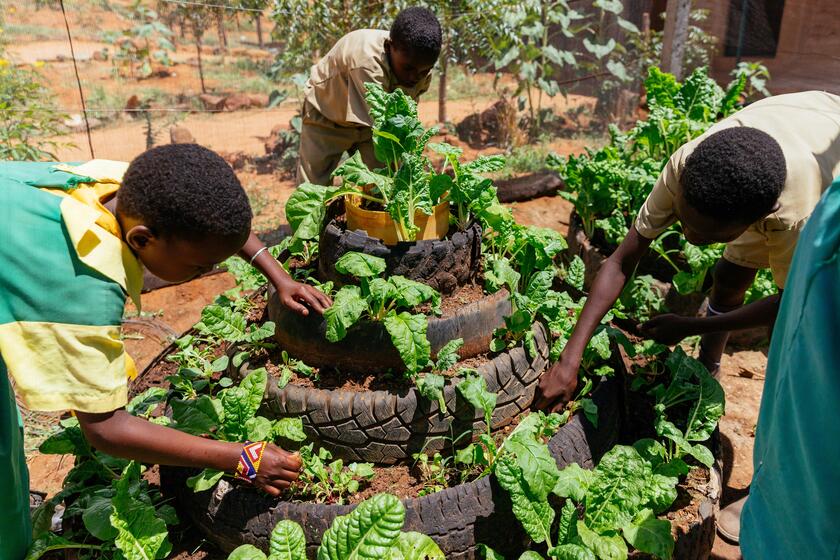
Sustainability is the basis for our future. At Johanniter we have set ourselves the goal of making our actions demonstrably transparent and sustainable to make a significant contribution to a future worth living.
Measures to adapt to climate change that improve the situation of the people most affected are already being taken into account in our international aid projects.
Learning together
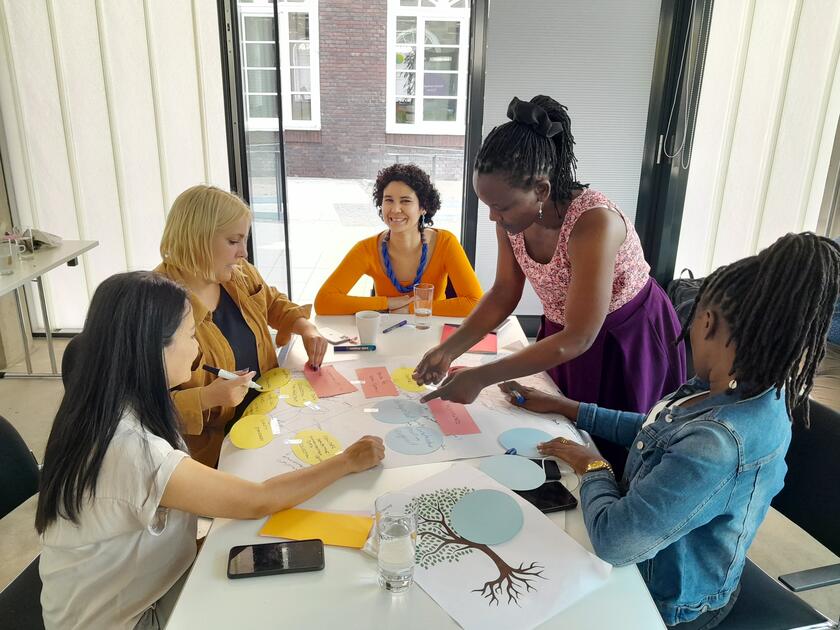
Planning, monitoring, evaluation and learning (PMEAL) - these are the key components of every project cycle. International Aid has developed its own PMEAL system and introduced it worldwide. In that respect, new tools have been developed and processes established.
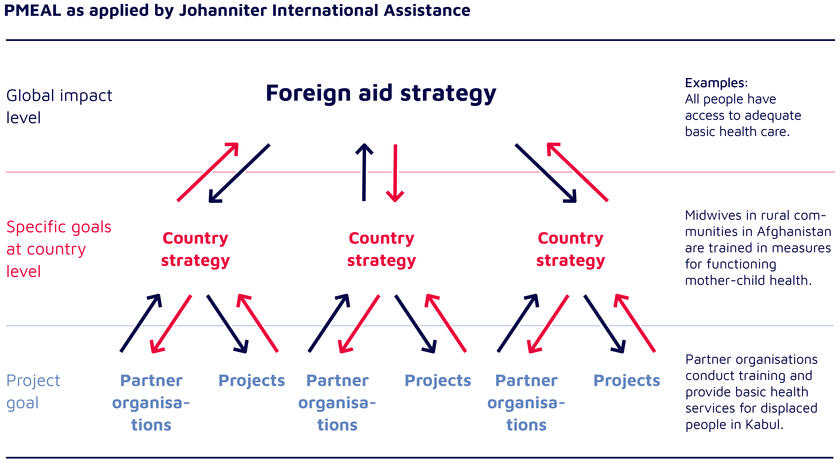
Johanniter International Assistance’s planning, monitoring, evaluation and learning system comprises the following levels:
Joint leadership
Two global projects are being implemented by way of employee input:
Leadership Principles
To support our employees worldwide even more effectively, the new leadership concept was introduced with nine binding guiding principles forming the basis on which we want to treat each other. We attach great importance to caring cooperation.
Standardised remuneration system
We aim to create a global, appropriate, transparent, harmonised and fair classification and remuneration structure for all positions within Johanniter International Assistance. This is also aimed at facilitating and simplifying global mobility, i.e. the transfer within Johanniter from one country office to another.
Safety for aid workers
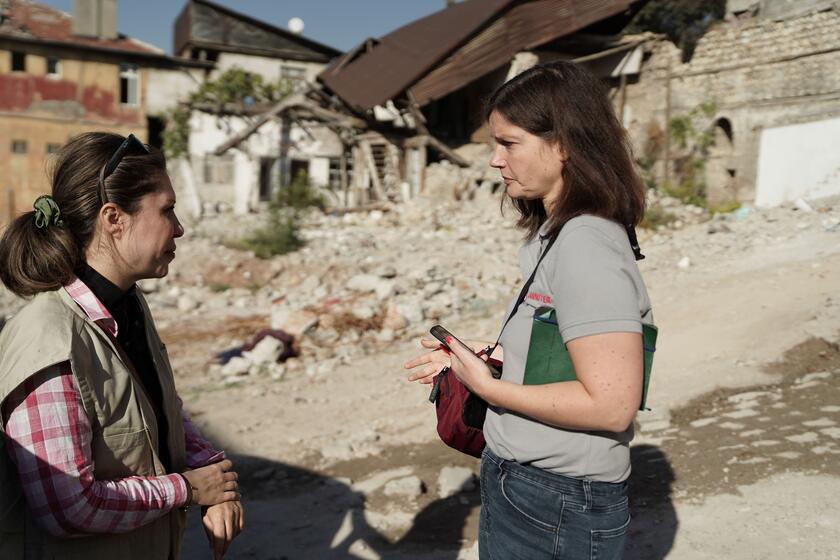
Incidents in which aid workers find themselves in dangerous situations are increasing in number worldwide. This applies to missions following natural disasters such as floods, earthquakes and epidemics, but also to dangers from shelling or kidnapping in armed conflicts. Internal security experts monitor the situation to protect them. They are always well informed and draw up detailed security plans based on risk analyses. These plans provide for how and where employees are allowed to move around on site, how offices and accommodation must be protected and how communication is organised.
Logistics in fragile contexts
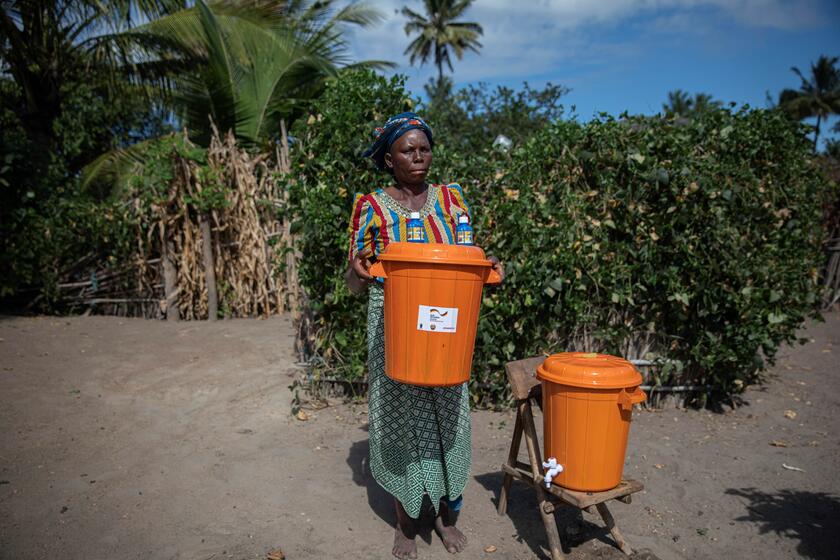
Working in fragile states is not easy, in particular when procuring relief supplies. As part of our aid measures, we need medical supplies, medicines and food in particular. Procurement is particularly challenging in fragile contexts: transport routes are interrupted, violent conflicts lead to disruptions in the supply chain and, last but not least, those involved are also exposed to risks. This is why we are developing robust emergency plans, reviewing transport routes and increasingly focussing on local procurement to reduce dependence on long supply routes.
Forgotten Crisis
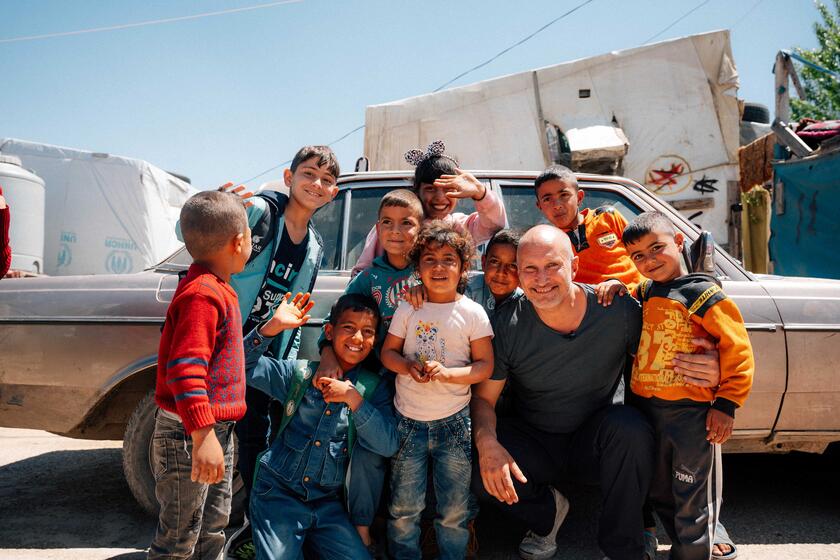
In conjunction with 31 German aid organisations and the support of the German Federal Foreign Office, we drew attention to crises worldwide via the #InDenFokus campaign.
The campaign focussed on Lebanon, Bangladesh and South Sudan.
If an emergency situation suddenly occurs, affected people need to be able to meet their basic needs to return to a life of safety and dignity. To achieve this, we work with our partners to focus on providing prompt, needs-based healthcare and support in securing the basics of life in emergency situations. Particular attention is paid to the most vulnerable people in affected communities.
Ukraine
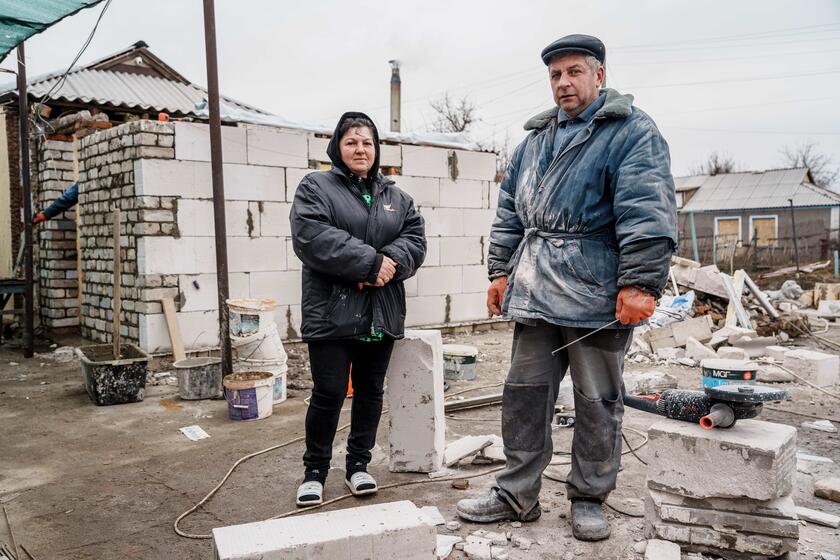
Emergency aid remains essential
In the third year since the start of the Russian war of aggression against Ukraine, about 40 per cent of the population is dependent on humanitarian aid. People in the east and south-east of the country above all are in need of support. Many are living in the ruins of their homes and are at least temporarily cut off from electricity and water supplies. They can no longer earn an income and their savings have been exhausted.
In conjunction with our partners ELEOS and NEW DAWN, we are supporting the people and making essentials available to them: hygiene articles, food, batteries and stoves for heating in the cold winter. Furthermore, destroyed roofs were re-roofed and houses are being sealed and windows installed.
Our partners distributed food, hygiene articles, building material and firewood to 327.000 people. Also more than three tonnes of medical suplies were delivered to hospitals in Ukraine and five ambulances and fire engines support with patient transport, mobile care and fire-fighting work.
Middle East
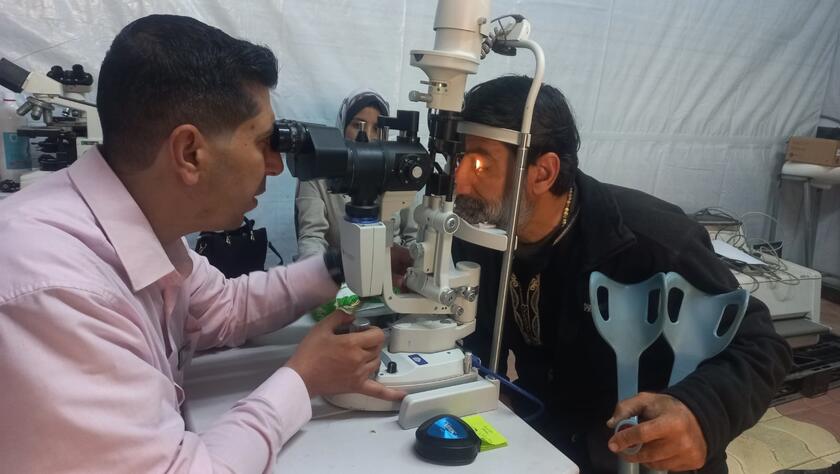
Medical Aid for people
Following the armed attack by Hamas on Israel on 7 October and Israel’s military response against Hamas in the Gaza Strip, fighting continues in the region. The civilian population is helplessly at the mercy of the fighting.
In Lebanon, too tens of thousands of people are fleeing to other parts of the country after fighting on the Israeli-Lebanese border. The Lebanese partner organisation Nabaa made food, beds, mattresses and cash available to displaced people from the border region with Israel.
In conjunction with our partners in East Jerusalem, the West Bank, Gaza and Lebanon, we are providing emergency aid as far as the security situation permits.
Outlook: Since May 2024, we have been working with St John to resume patient care in mobile clinics in Gaza. In coordination with the World Health Organisation (WHO), three medical stations have been set up in Rafah, Deir El Balah and Nuseirat Camp in the north of the Gaza Strip, where basic eye care, treatment of infections, blood pressure and blood sugar measurements, stitching of cuts, wound dressings and minor surgical procedures are performed.
Myanmar / Thailand
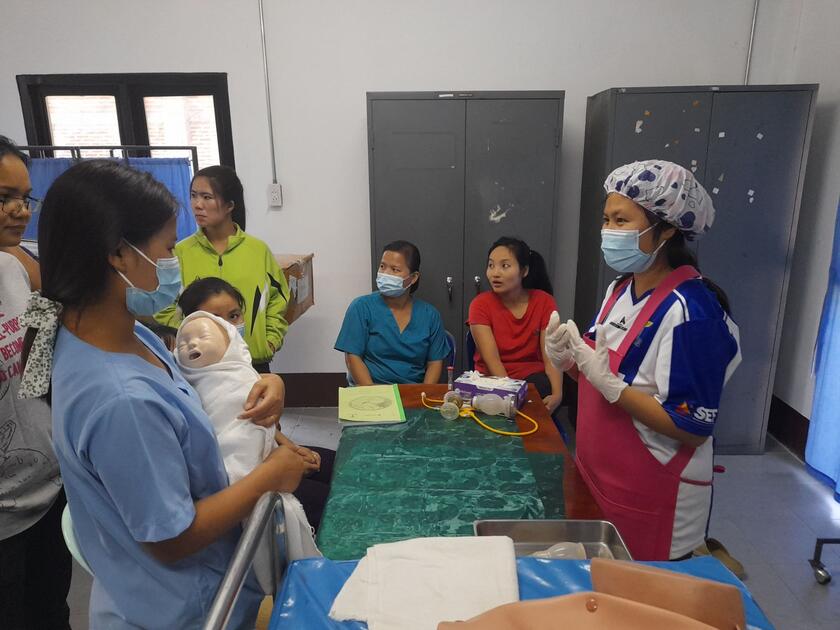
Hundreds of thousands are fleeing
On 1 February 2021, the military once again seized power in Myanmar via a coup. Armed conflicts have been raging between the Burmese military and armed groups throughout the country since then. The military has been conducting regular airstrikes again since October 2023, in particular, in areas where the Karen and Shan ethnic minorities predominate. According to UN figures, a further 628,000 people have fled inside and outside the country as a result.
In conjunction with our partners, we are supporting the people in these regions with basic foodstuffs, sanitary facilities and cash aid. In neighbouring Thailand, in the town of Mae Sot, we are working with the Else Kröner Fresenius Foundation to support the establishment of an emergency clinic in the Mae Tao Clinic, which provides emergency medical care to Burmese refugees.
Democratic Republic of the Congo
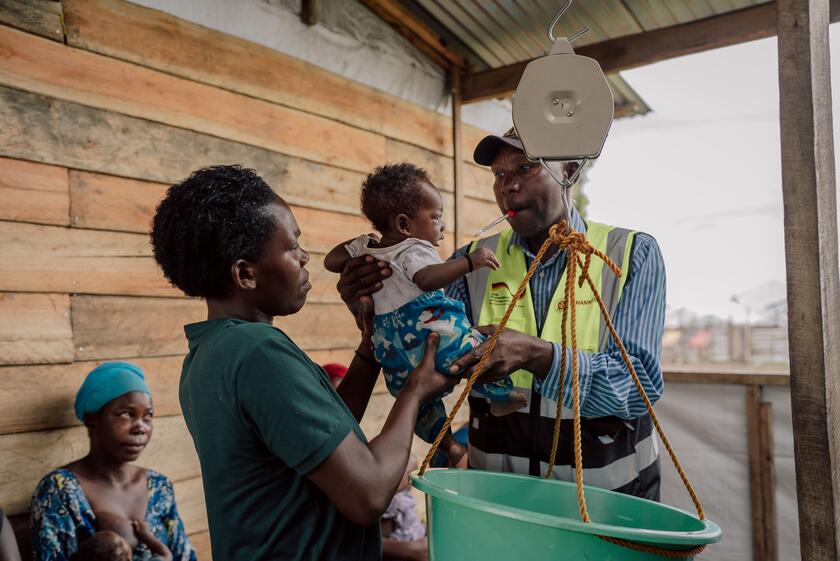
Medical treatment with mobile clinics
The renewed escalation of violence in North Kivu, in the resource-rich east of the country, has driven millions of people from their home villages. Many of them are settling in makeshift camps around the provincial capital of Goma.
We are providing emergency medical aid for the people in four of the camps. Consultations are held in mobile clinics, children are examined for malnutrition, and patients with serious injuries from gunshots or bombs are also treated.
Türkiye / Syria
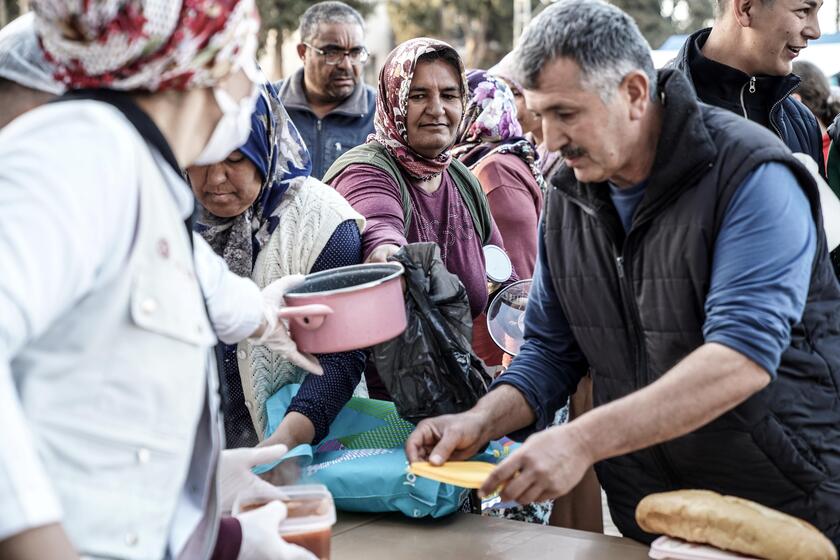
We helped after the earthquakes in February 2023
On 6 February 2023, devastating earthquakes shook Türkiye and Syria. More than 50,000 people lost their lives and 80,000 were injured. More than seven million people across the region were left homeless and have been dependent on humanitarian aid ever since. Many of those affected still live in tents or containers. In conjunction with our partners MAPS and BAHAR, we have been supporting the people in both countries with emergency aid measures since the first days after the earthquake.
According to forecasts by our partner organisation MAPS, reconstruction in Türkiye alone will take at least another three to four years.
Outlook 2024:
In conjunction with our partners, we are facilitating income-generating measures, such as handicraft work, by way of which people can earn money again and at the same time support their communities in the reconstruction process. Our partners also offer courses for men and women who want to start their own business. Psychosocial support - in particular for children and young adults - in dealing with the traumatic experiences after the earthquake and during the long war in Syria, is a further focus in 2024.
South Sudan, Kenya, Uganda
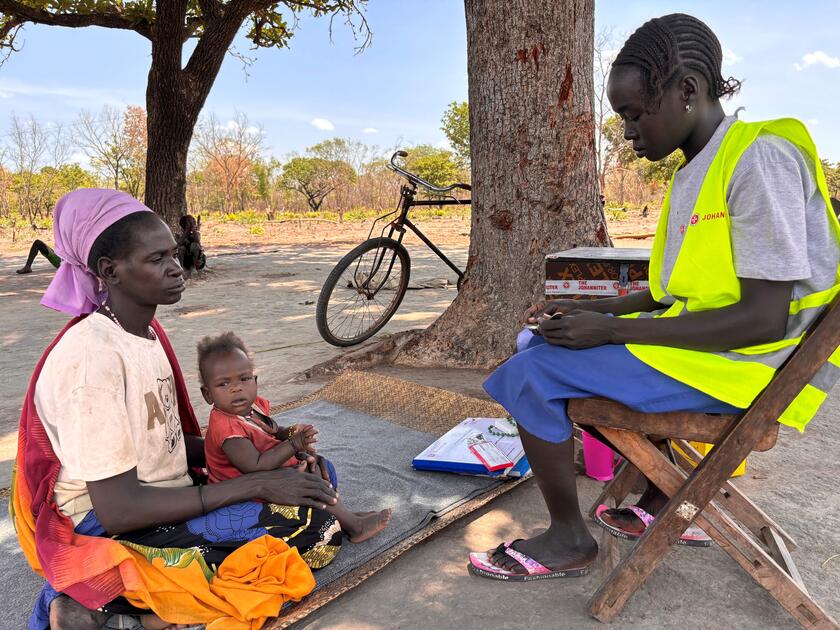
Three countries - one programme
We support pregnant women, children and particularly vulnerable population groups in South Sudan, Kenya and Uganda. Violence, poverty and natural disasters have meant that 9.4 million people in South Sudan were dependent on humanitarian aid in 2023. Many of them have fled to the neighbouring countries of Uganda and Kenya. Ensuring their supply poses major problems for all three countries.
We have, therefore, launched a transnational programme to provide basic medical care and access to water and food. The transnational approach has enabled us to gain important experience in working together across borders. Above all, the professional exchange and joint planning, reflection and learning have rendered the programme a success.
South Sudan, Ecuador, Colombia

Protection and help for victims of sexual violence
People all over the world are affected by rape and sexual assault. The chances of a safe and healthy life are unequally distributed between the sexes. Sexual assault is a particular danger for women and girls.
The consequences are dramatic: health problems, possible pregnancies, trauma, stigmatisation and, as a result, social isolation and poverty. In conjunction with our partners, we organise awareness campaigns in the villages, offer protection in so-called “Safe spaces” and provide those affected with medical assistance and psychosocial support.
Cambodia, Kenya
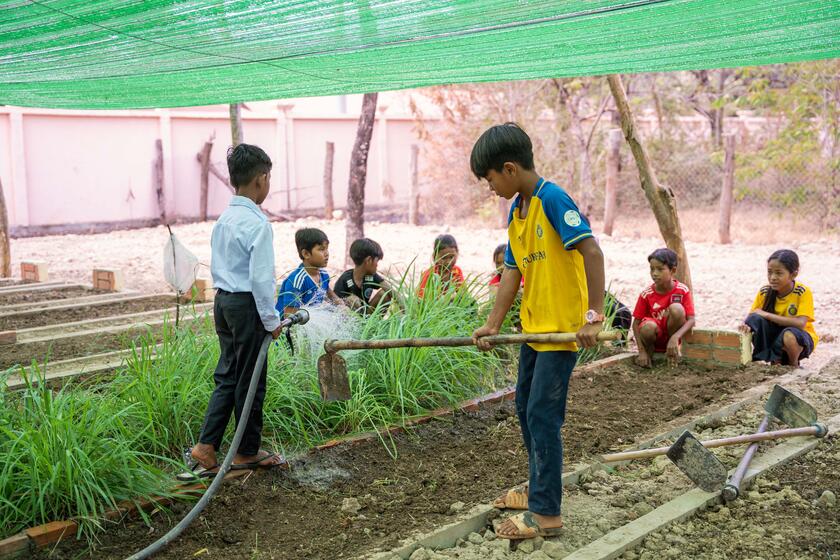
Confronting climate change
Climate change has a huge impact on agriculture: floods destroy harvests, droughts cause everything to dry up, people and animals go hungry. Irregular rainy seasons make it difficult for farmers to prepare and plant their fields in time.
We support small farmers in establishing and expanding climate-adapted agriculture and train young people in sustainable farming methods. Teaching young people to become sensitive to climate-adapted agriculture is one focus of our operations. In specially created school gardens, the pupils learn how to grow vegetables and eat a healthy and balanced diet.
They develop innovative methods such as vertical gardens on fences or drip irrigation with plastic bottles. They are, therefore, becoming pioneers in solving climate problems.
Statistics
Project expenditure, source of funds, development of donations and third-party funds used and outlook on planned project expenditure for 2024
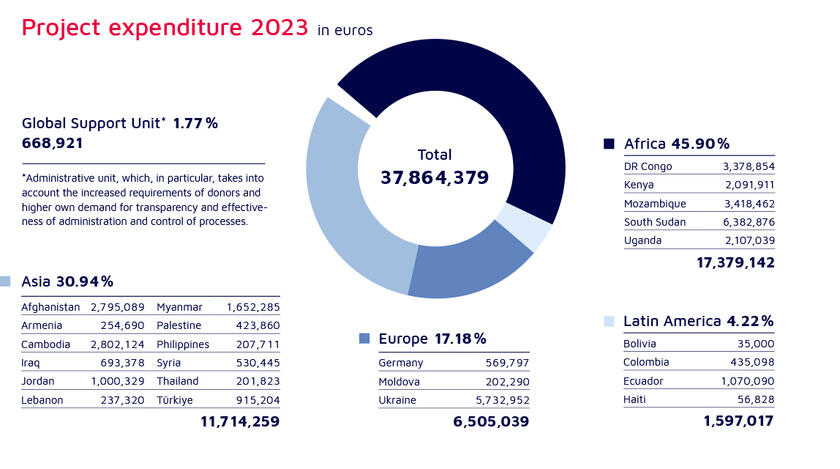
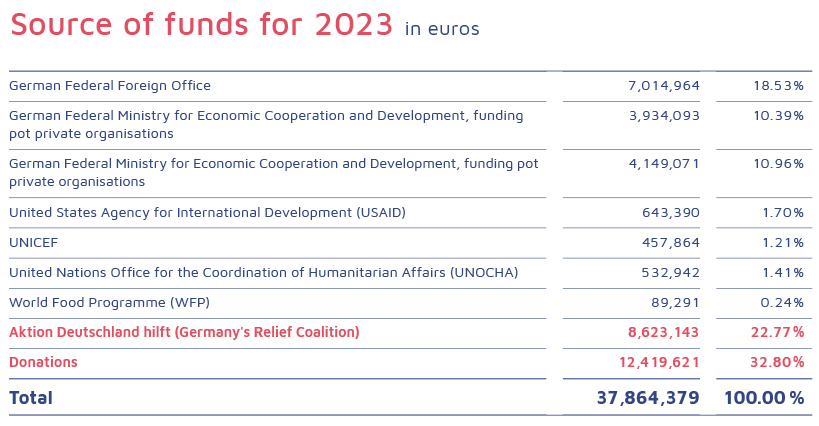
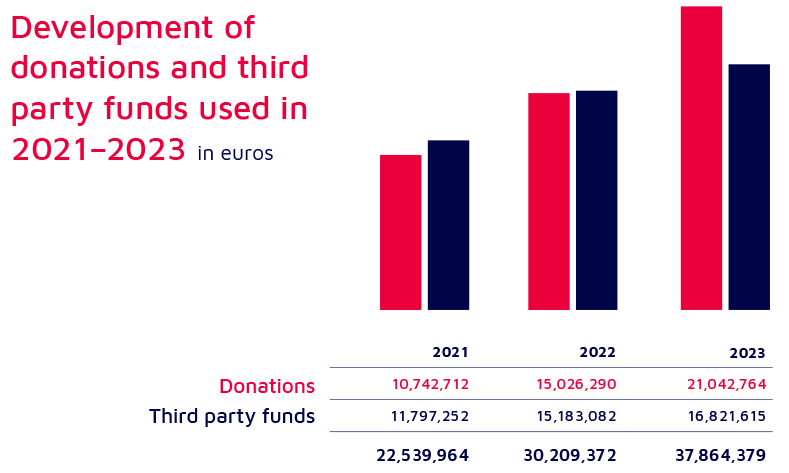
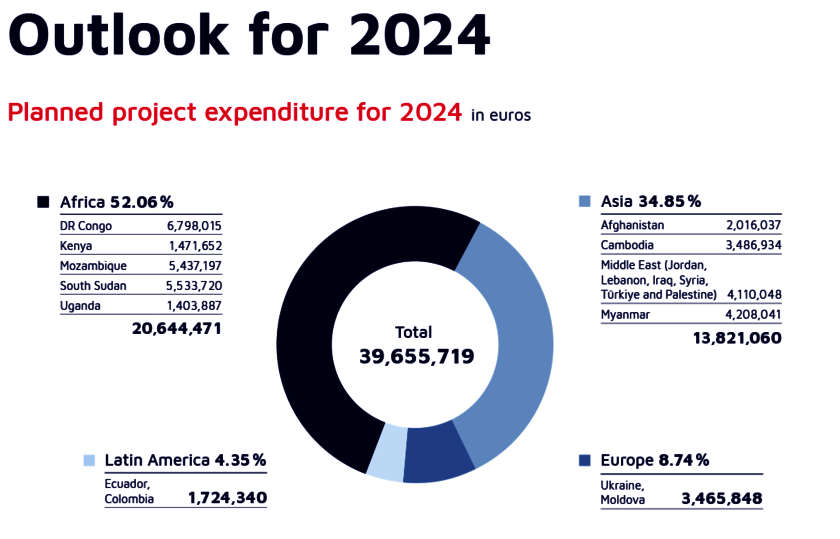
Our networks
Achieving more together
The work of Johanniter International Assistance would not be possible without our network. Alliances with other organisations also enable us to exchange knowledge and work more efficiently. This is why we are an active member of various networks and alliances. For example, we are involved in the umbrella organisations VENRO, VOICE and ICVA, as well as the Humanitarian Aid Coordination Committee of the German Federal Foreign Office, where we work together to develop positions on important humanitarian aid and development cooperation issues.
Furthermore, we are a member of various specialist networks to contribute and deepen our expertise on topics such as humanitarian aid, health and logistics.
For example, in 2021, we joined the German Health Alliance, a network of more than 100 leading German players in the healthcare sector. We have also been a member of the Centre for Humanitarian Action (CHA) since 2023. The CHA is the first German think tank on humanitarian aid.
Logistics also works better together. That is why we are involved in the Global Logistics Cluster, the UN Humanitarian Response Depot Network (UNHRD) and the Humanitarian Logistics Association.
To strengthen our Johanniter network, we are in regular contact with Johanniter and St John organisations in Europe and worldwide. In the Johanniter International Partnership (JOIN), the Johanniter and St John organisations in Europe and the Middle East regularly exchange information about their national activities.
